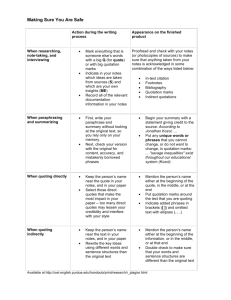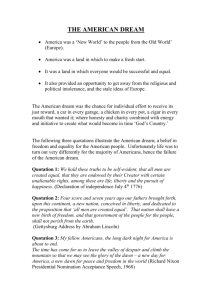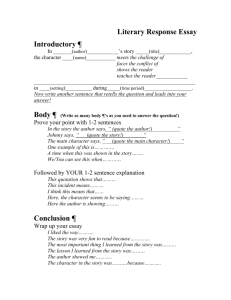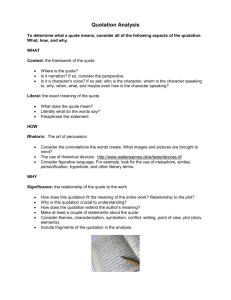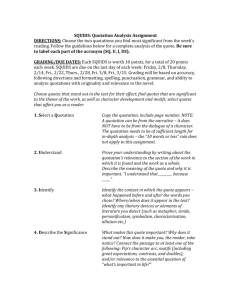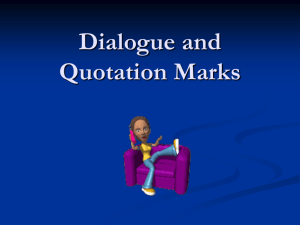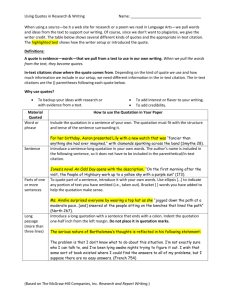File
advertisement
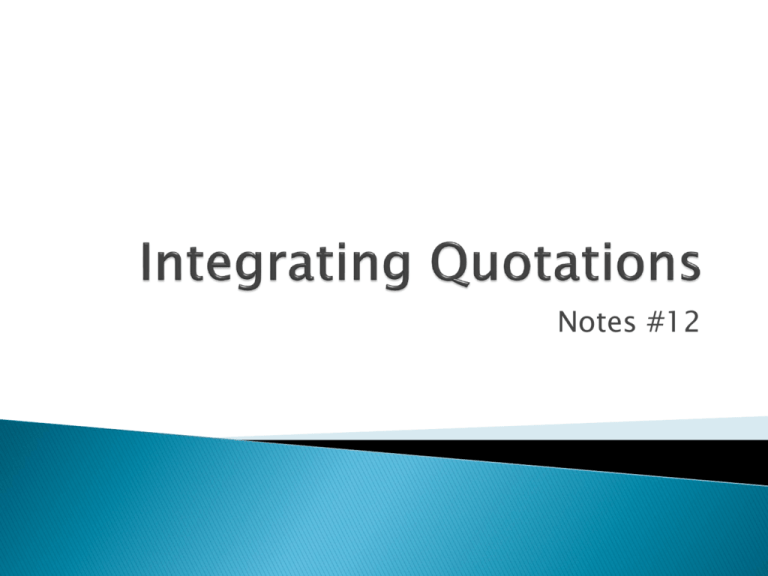
Notes #12 There are three options for integrating quotes: ◦ 1- Incorporate ◦ 2- Attribute ◦ 3- Use a sentence Incorporate the quotation into your sentence, punctuating it as you would if it were not a quote. ◦ Mukherjee argues in favor of an acculturation model “that differs from both the enforced assimilation of a ‘melting pot’ and the Canadian model of a multicultural ‘mosaic’”(4). If you must change an element within the quote to make it work grammatically, use brackets to indicate change. ◦ Rodriguez describes his parents as “no longer [his] parents in a cultural sense” to express the alienation from his family. Introduce a full-sentence quotation by using an attributive speech tag like “he writes,” “she claims,” etc. ◦ Elaine Pagels asks, “Whom do we include in the ‘American Dream’?” ◦ Jacob Needleman claims, “A dream is a vision or truth, of what can be and ought to be, and a dream is a deception.” Do NOT use attributive speech tags to introduce a quote that is NOT a COMPLETE sentence. ◦ Incorrect: Rodriguez writes, “My parents, who are no longer my parents in a cultural sense.” Use a full sentence of your own to introduce a full sentence by the quoted author. You must use a colon to introduce the quotation in this case. ◦ Jacob Needleman says it best: “A dream is a vision or truth, of what can be and ought to be, and a dream is a deception.” Colons will be used after your COMPLETE sentence that could normally stand alone in your paper without the quote. Commas should be used if your writing is NOT complete and could not effectively stand by itself without the quote. (your attributing quotes would fall under this category) Capitalize the first letter of any COMPLETE SENTENCE you quote unless you introduce it with “that.” ◦ In describing the New World, de Crevecoeur claimed, “The rich and the poor are not so far removed from each other as they are in Europe” (1). ◦ De Crevecoeur claimed that the “rich and the poor are not so far removed from each other as they are in Europe” (1). If the quotation is broken into two parts, do not capitalize the first letter of the second part. ◦ “Our team is bound to win,” said Coach Glass, “because UHS students are excellent players.” Commas and periods go WITHIN closing quotation marks, EXCEPT when a parenthetical reference follows the quote. ◦ Jacob Needleman said, “A dream is a vision or truth, of what can be and out to be, and a dream is a deception.” ◦ In her essay, Dr. Linguist notes, “The gestures used for greeting others differ greatly from one culture to another” (3). When colons and semi-colons are NOT part of the quotation, put them outside of the closing quotation marks. ◦ At the English Department meeting, Ms. Balzer voiced her opinion on the rules for integrating quotations: “They’re not intuitive, but they are very important”; several other teachers agreed. If a question mark, exclamation point, or dash is part of the original quotation, place it WITHIN the closing quotation mark. ◦ Elaine Pagels asks, “Whom do we include in the ‘American Dream’?” (5). If it is part of YOUR sentence, place it OUTSIDE the closing quotation mark. ◦ Do other columnists agree with David Brooks’ claim that “maximum status goes to the Gladwellian heroes who occupy the convergence points of the Internet ecosystem” (2)? Use ellipsis (…) marks when you want to quote the beginning and end of a passage but not its middle. ◦ The war was not immediate to the boys. “Bombs in Central Europe,” said Gene, “were completely unreal to use here…because our place here was too fair for us to accept something like that” (23). You do not need to use ellipsis marks if you begin or end your quotation in the middle of the sentence. Use ellipsis sparingly!! Use block quotes when your quote is 4+ lines long. Use block quotes sparingly, if at all. When using, begin quote as new line of text. Indent 1 inch from where you were previously typing. Do not use quotation marks. Parenthetical citation goes OUTSIDE final punctuation within quote. In his poem “The Problem,” Ralph Waldo Emerson explores the inner philosophical struggle of a religious yet unorthodox man: I like a church; I like a cowl; I love a prophet of the soul; And on my heart monastic aisles Fall like sweet strains, or pensive smiles: Yet not for all his faith can see Would I that cowled churchman be. (1-7)
